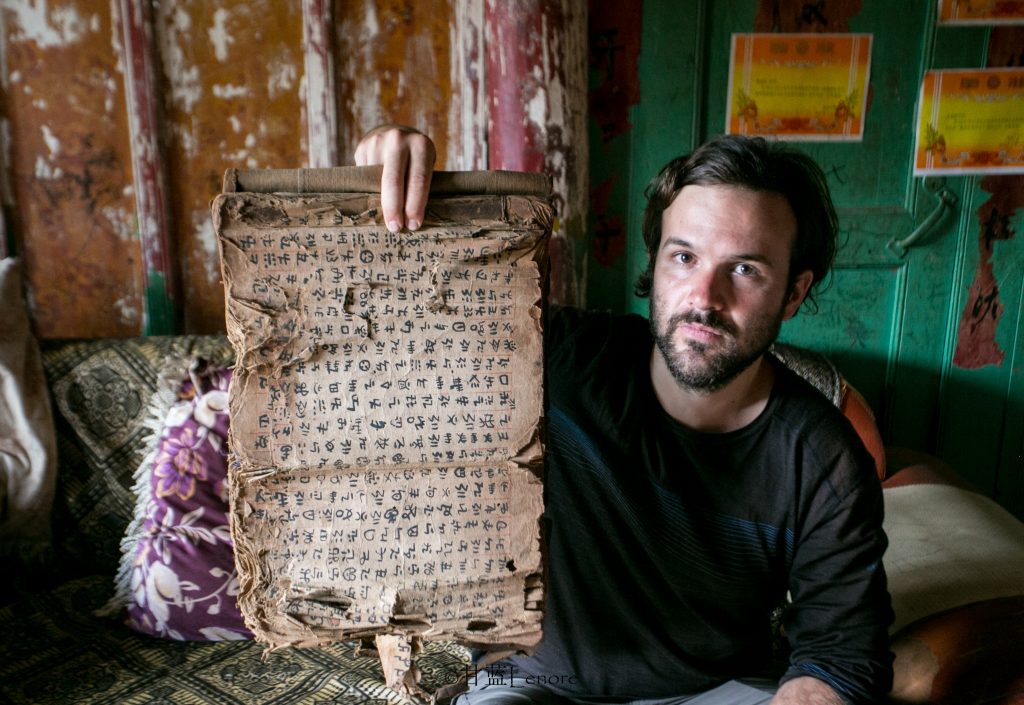
采访时间:2013年7月 Interview Date: July, 2013
柯扬:1983年前出生于捷克共和国布拉格。2006年第一次以背包客的角色来中国,2007年放弃IT专业,在布拉格查理大学东亚系学习汉学,同年第一次来成都旅行。2009年—2011年,在四川大学学习中文,并对凉山的彝族和周边的摩梭族产生浓厚的兴趣并深入研究,2012年7月,出版第一本书 Střípky z jižního Podnebesí(捷克语)。他希望从汉文化主宰的文化意识形态中,寻找到拾回传统的中国梦。
Jan Karlach: whose Chinese name is Ke Yang, was born in Prague, Czech Republic, 1983. He came to China for the first time in 2006 as a backpacker; in 2007, as a student at Charles University in Prague, he changed his major from IT to sinology of Department of East Asia and came to Chengdu for the first time. From 2009 to 2011, he studied Chinese at Sichuan University, during which he started to pay much attention to the Yi nationality in Liangshan and Mosuo nationality in its surrounding areas and deeply researched them; in July 2012, he published his first book Střípky z jižního Podnebesí in Czech. He hopes to rediscover traditional Chinese dream that lies in a cultural ideology dominated by the Han people’s culture.
https://www.karosh.net/
※
边缘产物是文化核心的一面镜子
Marginaloutcome is a mirror for cultural core.
与其做梦,柯扬更喜欢探索和尝试。这促使他的兴趣爱好涉猎很广,从古生物、地理学、音乐到旅行、人类学、当代文学、摄影等等,善于跨学科思考的他喜欢回归自然,他说:“在富有生趣的自然和人文景观的乡间漫步,所来带的开心是世界上任何其他事都不能等同的。”凭借这种“乡村痴汉”情结,2009-2011年在四川大学学习汉学期间,柯扬行走至中国西南部很多“荒郊野岭”。当喜欢探索“非主流”文化和边缘产物的柯扬,发现被汉文化包围影响的彝族和摩梭族,依旧努力按自己的方式生活时,他被这种坚持和固执所着迷。
Jan Karlach prefers discovery and trial to dreaming, so he shows interest in many fields – paleontology, geography, music, traveling, anthropology, contemporary literature, photography, etc. He is good at interdisciplinary thinking and likes nature. He said: “when walking in countryside with vital nature and cultural landscape, I can feel a joy that cannot be brought by any other thing in the world.” With such a complex of “passion for countryside”, during his study of Chinese at Sichuan University from 2009 to 2011, Jan Karlach walked to the “wilderness” in southwestern China. When Jan Karlach, a young man who loves to explore “non-mainstream” culture and marginal outcome, found the Yi people and the Mosuo Nationality who are surrounded by Han culture leading life in their own way, he was attracted by such an adherence.
“像凉山这样的少数民族地区对中国历史而言,与文明社会的文化核心居于同样重要的地位。边界和偏远地区的产物实际上是文化核心的一面镜子。”柯扬认为:“边界通常是各种有趣事物的繁荣之处,它会自主生成一个大熔炉,无论是文化、地理还是民俗,将思想、概念、精神在交汇和碰撞中变化成长。纳西族和藏文化的共存,摩挲族与彝族的相互影响,皆是如此。”
“Throughout Chinese history, minority areas such as Liangshan played an equally important role as that of cultural core of the civilization. The outcomes in boundary and remote areas actually are a mirror for the cultural core.” According to Jan Karlach, “Usually, boundary is home to interesting things and will autonomously become a melting pot, where thought, concept, and spirit develop together through communication and crash no matter in terms of culture, geography, or folk customs, which can be evidenced by the coexistence of the Naxi nationality and Tibetan culture and the interaction between the Mosuo nationality and the Yi nationality.”
城市化进程需要承上启下
The urbanization requires succession and creation.
柯扬举例说:“捷克人喜欢喝捷克啤酒,就像四川人喜欢喝茶打麻将,但是大部分人对自己的传统知之甚少。这个时代非常具有侵略性,它让传统文化退居其次。”他曾经去到四川自贡的牛佛古镇,被古老的茶馆和旧建筑所吸引,而当他与当地人交谈时,他们大多对此“落后”、“破旧”和“迷信”的建筑感到羞愧,而横跨于小镇上面新建的混凝土桥被视作“美丽”的象征。
Jan Karlach said, “Czechs loves Czech beer just like Sichuan people enjoy tea and play Mahjong. But most people know little about their own tradtion. The era is obviously marked with aggressiveness and tradition is forced to take the second place.” He oncewent to Niufo Ancient Town, Zigong, Sichuan and was attracted by the old tea houses and architectures there. When talking with locals, he found that most of them thought that the “backward”, “shabby”, and “superstitious” architectures are a shame and the concrete bridge over the small township a symbol of “beauty.”
这类现象在柯扬看来,是中国当下的一种对传统认知的缺失,而中国的“文化认同危机”(cultural identity crisis)迟早会被越来越多的人谈起。全球皆被快节奏的消费社会所侵蚀时,捷克的情况并非好于中国,只是令柯扬感慨的是:“捷克国人关心历史和文化遗产,为此感到骄傲,并珍惜它。”进行跨学科研究的柯扬理解文化“同化”的自然属性,他说:“这是人类历史中持续发生的状态,只是现代化的进程需要与传统文化手牵手,需要更多的承上启下。”
In Jan Karlach’s opinion, such a phenomenon embodies poor understanding of tradition in today’s China and China’s “cultural identity crisis” will be mentioned by an increasing number of people sooner or later. The whole world is being eroded by fast-paced consumer social culture and the condition in Czech Republic is not better than China, but Jan Karlach also sighed: “Czechs care about history and cultural relics, and feel proud of and cherish them.” Jan Karlach’s inter disciplinary research helps him understand that “assimilation” is the natural quality of culture. He said: “It continuously happens in the history of human beings, but modernization needs tradition and more succession and creation.”
“在我来中国之前,大家告诉我亚洲人的情感表达是温和有节制的,可我所见到的中国人非常有情感,愿意为梦想奋斗。保护文化唯一的方法是文化携带者拥有强大的意志力。”柯扬说起在《Vice》杂志上看到的关于崔健的一个采访,崔健说:“国很大,有非常好的文化。儒家教育人们如何与他人为善,却没有告诉人们如何善待自己。我们在寻找自我的路上迷失了,这是文化中很糟糕的部分。”而后,一直严肃的柯扬打趣地说:在中国传统文化的传承中,至今保持丰富鲜活的、或许永远不会消失的,当属中国美食。
“Before coming to China, I was told that Asian people expressed their feelings in a mild and restrained way. But the Chinese people I have met are very sentient and willing to strive for their dreams. The only solution for protecting culture is the strong will of cultural carriers.” Jan Karlach mentioned an interview with Cui Jian on Vice, Cui Jian said: China is big and it has really a beautiful culture. Confucius teaches people, how to be nice to other people, but doesn’t teach people, how to be nice to themselves.We have totally lost the direction about searching ourselves. This is the bad part of the culture. And then, Jan Karlach abandoned his serious expression and had the funny viewpoint: Food is the only Chinese tradition that is still plentiful and alive and may exist forever.
链接LINK
崔健在采访中的原话如下:“中国很大,有非常好的文化。儒家彻底摧毁了中国文化,这是中国最坏的部分。儒家教育人们如何与他人为善,却没有告诉人们如何善待自己。我们在寻找自我的路上迷失了,这是文化中很糟糕的部分。大家不要听他的,他是一个古人,出生在两千年以前,在他的那个时代,他说得对,但是不适合于当下。”
Cui Jian said on Vice:“China is big and it has really a beautiful culture. Confucius has totally destroyed the culture of China. It’s the worst part of China. Confucius teach people, how to be nice to other people, but doesn’t teach people, how to be nice to themselves… We have totally lost the direction about searching ourselves. This is the bad part of the culture. People, don’t listen to him! He is an old guy, born 2000 years ago. For his age, his teachings were OK, but not for now.”
※
